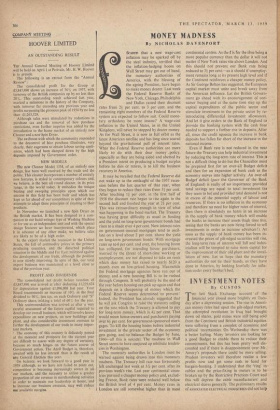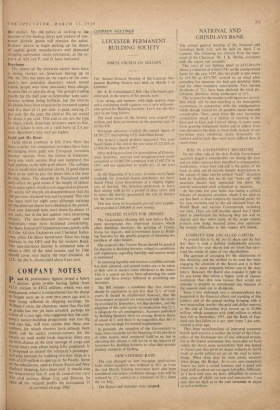INVESTMENT NOTES
By CUSTOS
THE last Stock Exchange account of the financial year closed more brightly on Tues- day after a depressing session. The rise in Ameri- can money rates had upset the gilt-edged market, the attempted revolution in Iraq had brought down oil shares, gold mines were still being sold from the Continent and British industrial equities were suffering from a complex of economic and political 'incertainties. On Wednesday there was a better feeling. Many investors are looking for a good Budget to enable them to reduce their commitments, but this has been pretty well dis- counted and if there is disappointment over Mr. Amory's proposals there could be more selling. Prudent investors will therefore realise a few profits now and get some cash in hand for bargain-hunting. I understand that the 'ring' in cables and the price-fixing in meters is to be broken up by the Restrictive Practices Court and this will depress the cable manufacturers' and electrical shares generally. The preliminary results Of ASSOCIATED ELECTRICAL INDUSTRIES did not help this market. My old policy of sticking to the equities of the leading stores and makers of con- sumer durable goods still remains the safest. Brokers' advice to begin picking up the shares of capital goods manufacturers and depressed shipping companies seems premature, as the re- ports of AEI and P. and 0. have indicated.
Be veliams
The shares of the BEECHAM GROUP have been a strong market on American buying up to 30 ,. 6d. This has been on the report of the com- pany's new penicillin discovery which would enable people who have previously been allergic to penicillin to take the drug. The group's trading results for the half year to September were satis- factory without being brilliant, but the interim thvidends have been raised on the increased capital an I if a final of 11 per cent. is paid, making 25 Per cent. for the year, the yield at 30s. 6d. would be about 4 per cent. This and GtAxo are the type of share which American investors seem to like. an I as Glaxo is now on a yield basis of 2.4 per cent. Beecham's may well go higher.
(;old and De Beers Gold shares continue to fall. First, Paris has been a seller, for continental investors have been exchanging from gold into European 'common market' equities. Next, the failure in Johannes- burg was more serious than was supposed, but had nothing to do with gold shares. The collapse was in mushroom industrial shares. If good shares have to be sold to pay for losses this is the time to buy them. The disorder in Nyasaland could Only effect the gold mines if the supply of labour were interrupted, which is not suggested at present. DI- BEERS fell sharply on disappointment that the 200 per cent. dividend was not increased. This rate has been held for eight years although earnings O n the deferred shares have doubled in the period. last year diamond sales were down by about 15 per cent., but in the last quarter were recovering Sharply, The non-diamond income—gold and industrials—must have increased considerably. l)c Beers Industrial Corporation owns jointly with 1(1 the African Explosives and Chemical Indus- tries, while De Beers Investment Trust has large interests in the OFS and the far western Rand. The non-diamond income is estimated now at about a fifth of the total income and by 1960 should cover very nearly the total dividend. At 122s. 6d. the 5s. shares yield about 8 per cent.



















































 Previous page
Previous page